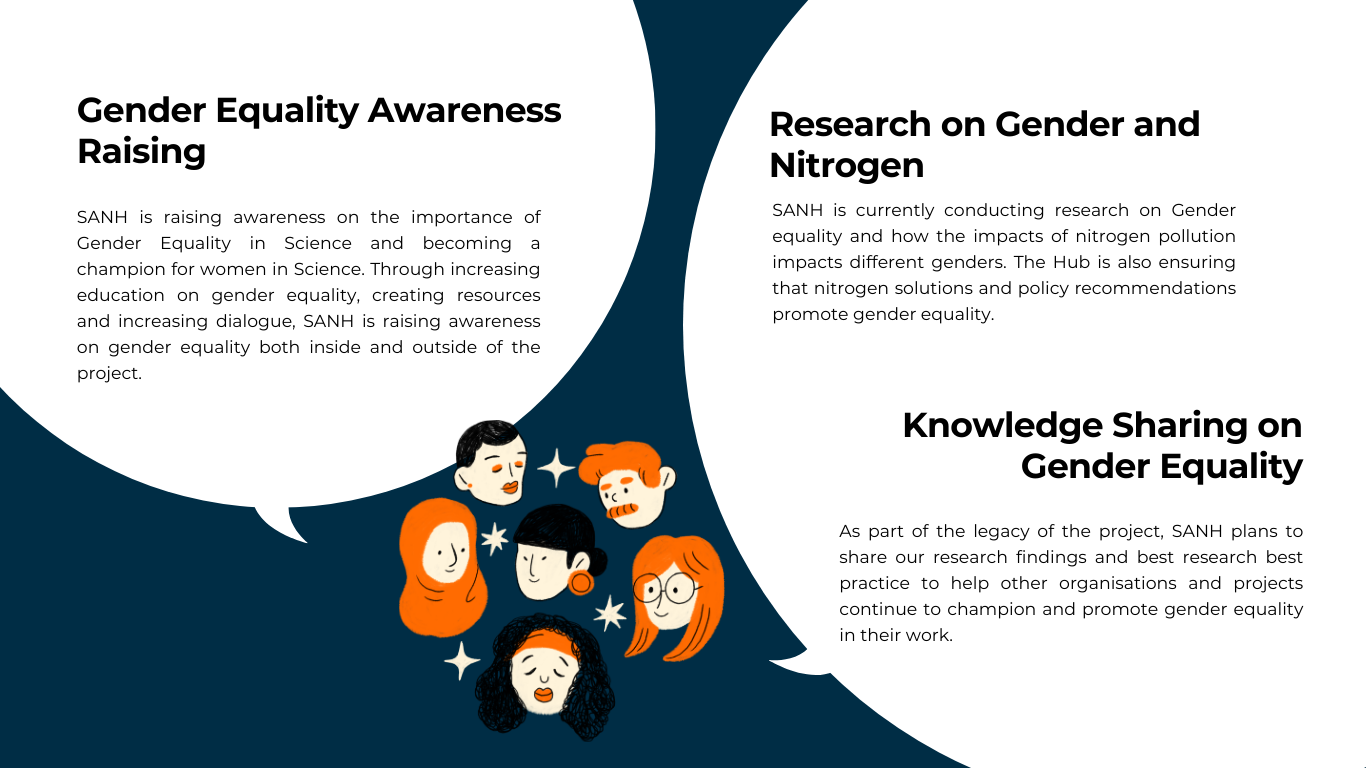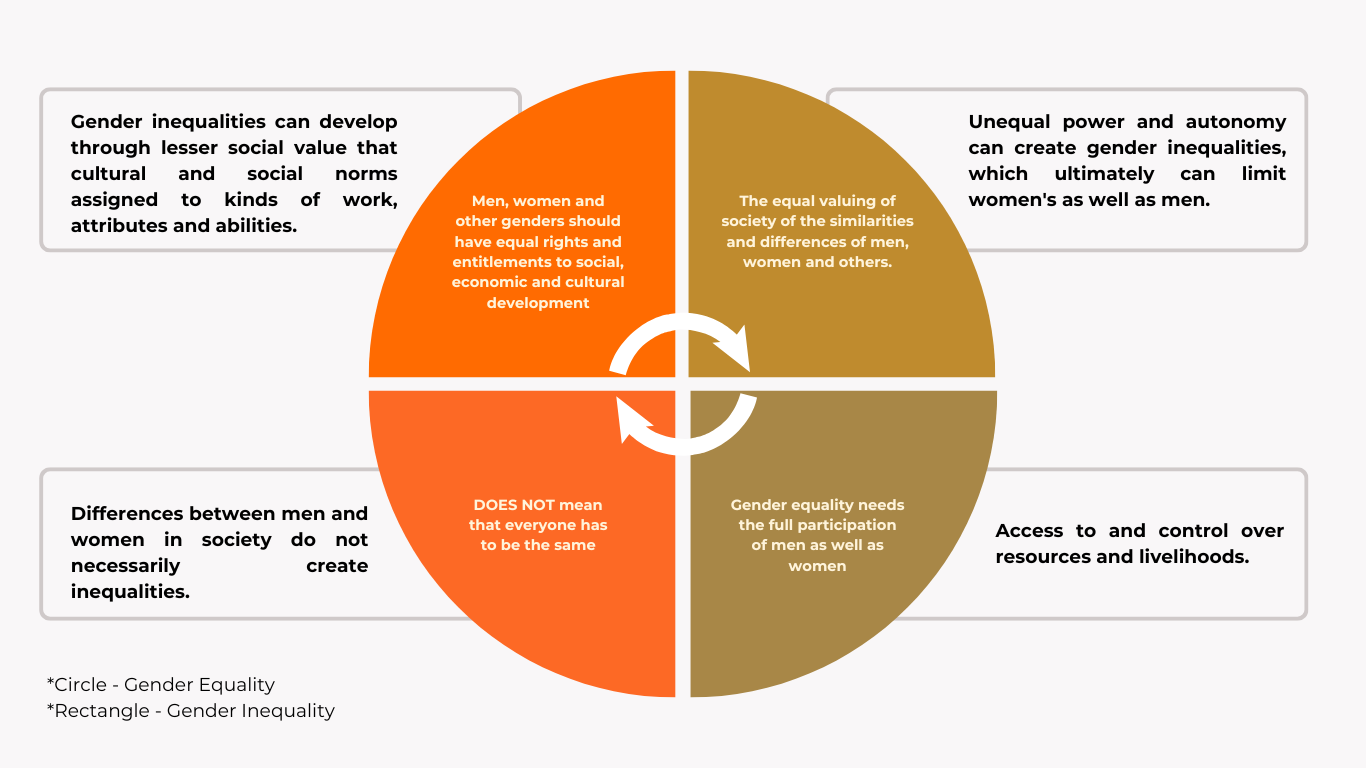Every person, regardless of their gender, should have equal rights to human, social, economic and cultural developments and an equal voice in civil and political discussions. The UKRI GCRF South Asian Nitrogen Hub (SANH) aims to contribute to reducing the impacts of both nitrogen pollution and poverty in a way that is likely to reduce inequality between people of different genders.
This statement outlines how SANH is ensuring that inequality is not perpetuated, that the different rights and needs of all genders are recognised and addressed and that people of different genders share the benefits of our research.
As a large international project, SANH aims to create an environment that is fair and equitable for all its members. We provide our members with equal opportunities to engage with the research network and their participation in the Hub process. This ensures the inclusion of both men and women and promotes gender equality across the project. To ensure Gender Equality, we have established the SANH Gender Equality Working Group, which meets for a virtual meeting every six months to explore the challenges that its members face and brainstorm ways to make the project fairer for all members. All SANH members of any gender, nationality and discipline are welcome to join the group. The following pie-chart shows the total percentage of men and women in SANH:
Equal and Meaningful Opportunities
SANH is dedicated to ensuring equal opportunities for people of all genders in every aspect of our project. Maintaining gender balance at all levels from the Executive and Advisory Groups to our Early Career Researchers ensures that the perspectives of women in research are promoted. In particular gender balance within the Ethical Advisory Committee, allows for the views of women to be included in important discussions on research ethics and safeguarding. The Hub makes a particular effort to provide training and capacity-building opportunities for early career researchers and encourages women to participate and host these sessions. SANH also works on increasing inclusion for all genders and structures meetings in ways that create equal opportunities for all members to share their views and perspectives.
Gender Equality in SANH is not just limited to our members but also those who participate in and benefit from our research. All of our social science and policy work aims to include a balance of perspectives. This is achieved by providing equal and equitable opportunities for men and women to participate in our research whilst ensuring their wellbeing and safety. SANH also works on increasing women's participation in the nitrogen policy arena to promote gender equality in policymaking.
SANH's Impact on Gender Equality
The impacts of nitrogen pollution and its solutions revolve around people. Therefore the nitrogen challenge has an intrinsic gender aspect which is being explored by our research. There are SANH social surveys being conducted to explore possible nitrogen mitigation solutions at a village level. They examine how nitrogen pollution impacts different genders and evaluate possible solutions that protect both genders from pollution and encourage gender equality.
They look at the socio-economic impacts of nitrogen pollution on Himalayan lichens and coral reefs. This work helps us better understand how nitrogen pollution impacts different genders and discover ways to protect these ecosystem services in a way that fosters gender equality. We use all of our research to provide policy recommendations that focus on improving the environment in a way that improves gender equality.
Nitrogen Pollution and Gender Roles
Due to current gender roles, women and children are increasingly susceptible to the environmental, social and health impacts of nitrogen pollution. Through evaluating village-based solutions from a gender equality perspective, SANH aims to help reduce the impact of nitrogen pollution on all people, especially women and children. Taking gender roles into account, empowering nitrogen solutions can increase gender equality through changing the roles and responsibilities in households and villages.
Ensuring Gender Equality
The SANH Gender Equality Working Group ensures gender equality throughout the Hub and that unintended negative consequences on gender equality are avoided or mitigated. The group monitors our progress towards SANH's gender equality aims, included in the SANH Gender Equality Strategy. They also implement tools to improve equality for all Hub members. The group which meets multiple times a year also identifies any risks or unintended negative consequences on gender equality and develops practical solutions to these issues.
Gender and Data
Data is key to SANH measuring its progress towards all of its gender equality goals. Data disaggregated by age and gender from village-level surveys helps explore how gender roles can be modified for both increased gender equality and nitrogen pollution mitigation. The data generated in SANH’s social science and policy work is utilised to help create policy recommendations that benefit both genders and promote equality. Within the Hub itself, data is vital in ensuring gender balance at all levels. Age and gender data, collected where appropriate, is also used to explore meeting accessibility and engagement. Lastly, survey data from across the Hub is used by the Gender Equality Group to examine ways to improve opportunities for all Hub members and to identify and address any unintended negative consequences on gender equality.
As a international project, we aim to create an environment that is fair and equitable for all its members. The Hub makes sure to provide its members equal opportunities to engage with the research network and participate in Hub processes. This ensures inclusion of both men and women and promotes gender equality across the project.
To support SANH's efforts in increasing gender equality, the project has developed a gender equality action plan act and raise awareness on gender equality in science.




